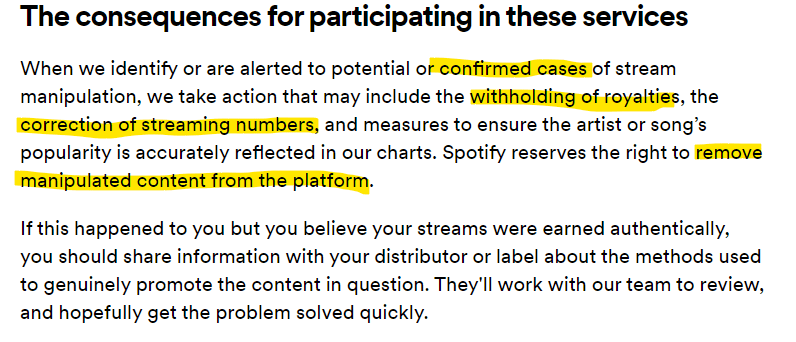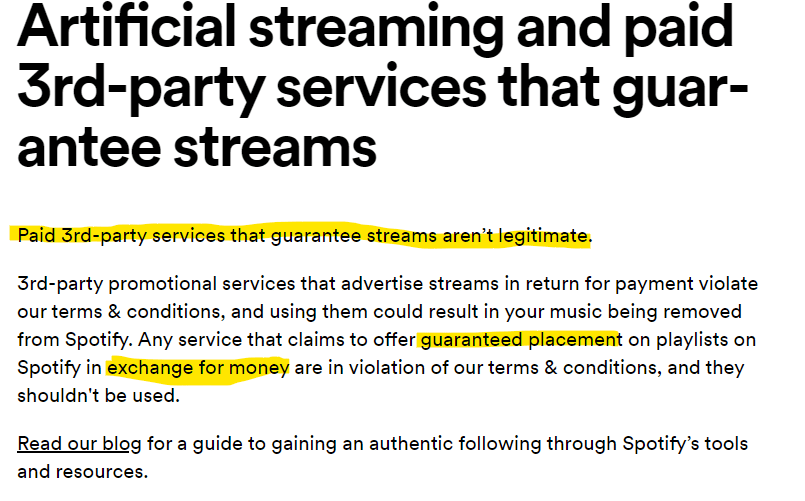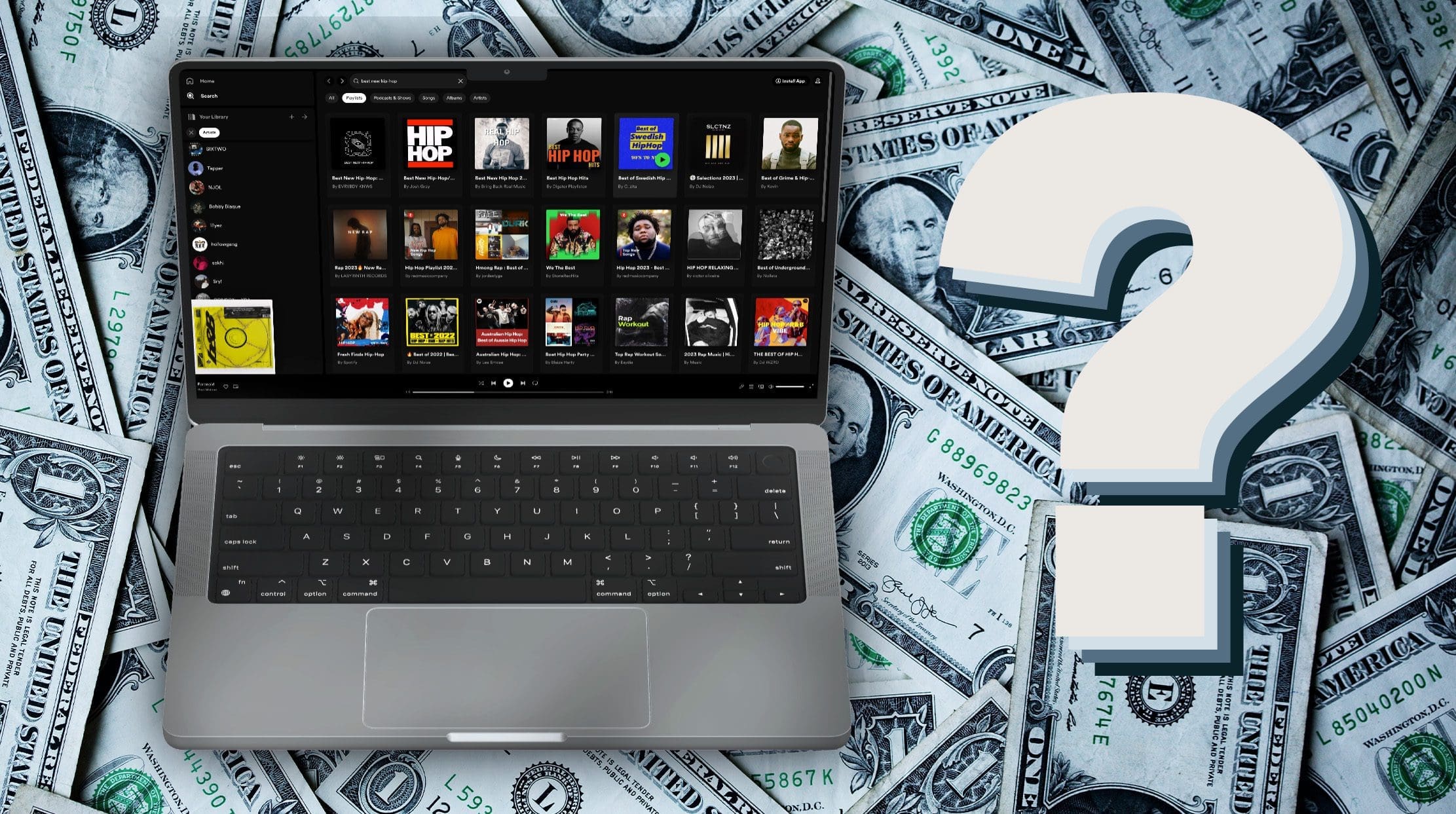Playlist pitching has become an essential part of an artist’s promotional strategy in the digital music era.
A placement on a popular Spotify playlist can significantly increase an artist’s visibility, help attract new fans, and boost stream counts.
However, with so many artists vying for a limited number of spots, reaching these playlists has become increasingly difficult.
Recognizing this challenge, several free and paid methods have emerged to help artists get their music onto Spotify playlists.
But before we start, let’s address the elephant in the room namely should you pay to get on spotify playlists? Is Paid Playlisting legit? What about payola?
Spotify has <not so clear> Policies about Payola and breaching them can significantly affect your music’s performance, and royalties and can even be taken down from the store.

Let’s dive into this guide to find out if there are any legitimate ways to pay for playlist pitching.
Here’s what this guide is about:
Paid Playlisting Guide:
Understanding Spotify’s Rules Around Paid Playlist Submissions
Spotify has laid out clear guidelines (okay, maybe not super clear — but we’ll get to that) to maintain fairness and integrity in their music ecosystem.

They allow direct submissions to their editorial playlists through the Spotify for Artists platform and so on. While that part is great, their general policies have some really massive grey areas and loopholes — and with no clear consistency in terms of enforcement, it comes off as out of touch with what music marketing looks like today.

From Spotify’s policies and articles published on Spotify for Artists, it’s pretty clear the following things aren not allowed:
- 3rd-party services that guarantee streams
- Artificial Streaming (not a real human listening)
- Selling a user account or playlist
- Paying / Accepting compensation for changing a name of a playlist
- Accepting compensation to influence the content of a playlist
Are there actually any legitimate paid ways to get on Spotify Playlists?
There’s not much of a debate regarding the first four bullets. No artist has the intention or benefits in any way from artificial streaming or fraudulent promotion that promises things they won’t deliver. You also don’t want a major label purchasing playlists from a user — as this would enable investors to essentially buy the entire playlisting ecosystem.
However, the vague phrasing in the last bullet raises some concerns. How does one really “influence the content of a playlist”? Is it receiving and reviewing pitches overall or just directly traded content? What really constitutes “accepting compensation?” Only cold hard dollars or are royalties, playlist trades and cross-promotion also included in this category? This is where we start to move into a gray area, that is consistently left unspecified by Spotify in their terms of service.
Digesting what Spotify actually means
To add to this, we have contacted Spotify to get a clear response from the official source regarding what’s okay or not, and the answer we got was “It is a sensitive issue for legal right now as work is still going on for regulations on this”. This was before the launch of Discovery Mode but we still haven’t got any concrete response.
To be clear, we are not Spotify and don’t have the truth. But we don’t consider any of the below examples as payola if they are done with integrity, fairness, and benefit artists and fans. Still, we believe it is time for Spotify to clarify what’s okay and what’s not so there is no doubt.
Paid Spotify Playlist Promotion Examples
In this section, we digress into the different variants of paid playlisting:
- Major Label Alliances
- Decentralized Label Alliances
- Label Playlists
- Pay-for-consideration
- Playlist Pitching as a service
- Playlist Curation as a service
- Spotify Discovery Mode
Major Label Alliances
Obviously, Major Label alliances such as Filtr, Digster and Topsify include a majority of the tracks from the label they are owned by. They might not get compensated directly by an artist paying them. However, the curators know that placing a song from the label is what essentially makes them go around. Is this influencing enough?
It’s important to remember that these playlist curators are not hiding their affiliations. These playlists help to centralize and promote an artist’s and label’s catalog, which can also be beneficial for fans of those artists. They also own the assets of both playlists and tracks so it would be very much like an artist adding its own songs in their own playlist. It feels like a stretch to claim Payola for these Label / Playlist Network alliances.
Examples of Major Label Alliances:
- Filtr – Sony’s label alliance. Get signed to a Sony-affiliated label or apply to The Orchard as your distributor to get a chance to be included.
- Digster – Universal’s label alliance, which functions very much like Filtr and Topsify.
- Topsify – Warner’s label alliance.
See our article on how to get your music to Filtr, Digster, and Topsify.
Decentralized Label Alliances
A decentralized label alliance is basically the same as a Major Label Alliance — but does not require association with any of the three majors (Sony, Universal, Warner). Instead, they are comprised of independent labels that have joined forces to create a resource shared between the labels rather than being a part of a singular label. The Alliance curates playlists, finds curators, and handles playlist marketing in exchange for some sort of funding disconnected from the pitching — focusing on sharing the costs between the labels rather than being a paid tit-for-tat service.
Collaborative efforts like Indie Alliance can help smaller labels and their independent artists gain visibility and even the playing field against major labels. As long as the collaboration is transparent and fair to all involved parties, this practice seems not to go against Spotify’s policies.
Examples of Decentralized Label Alliances:
Indie Alliance – a shared resource for independent labels open regardless of affiliation or distributor. Works with the whole catalog of a label, but also offers other useful tools for labels. However, it’s only for labels and you need to apply for access.
Label playlists
It’s not only major labels that are running their own playlists as an asset. With a similar reasoning as above, would it be okay for a label to license a song just because they know it would be the perfect fit on one of their playlists and in turn earn royalties for that inclusion?
We would argue in the same manner as for the Label Alliance example that it’s not against Spotify’s policies to add your own or licensed songs to your own playlists.
Pay-for-consideration
You are paying a small fee for a curator to consider the track, and give feedback. However, if you wouldn’t have paid the sum, they would have never heard it in the first place. Isn’t that influencing?
These services could also be seen as leveling the playing field for independent artists who might not otherwise have the means to get their music heard by playlist curators and is a much more efficient way than cold emailing. Why shouldn’t an artist be able to send their music to let’s say 100 curators for a fee of let’s say $100 instead of spending 10 hours? This also means that playlist curators are able to monetize the time they spend on listening meaning they can curate better playlists which in turn would be beneficial for the followers of the curator.
Pay-for-consideration – Playlist Pitching Examples
All of the below are pay-for-consideration services and offer 10% on your first campaign when clicking on the links below:
Playlist Pitching as a service
There are a bunch of companies offering to pitch your music to playlists as a service. They won’t pay the curator, just sending them emails, much like a publicist. You pay for their time.
This would be the pay-for-consideration model without actually paying for the curator’s time. Hence, an even more legit way to pitch music to curators. I think what Spotify is trying to avoid is the guarantee part and scam companies profiting from artists. But just because there are illegitimate companies out there in music PR that doesn’t mean the service itself is illegitimate or all companies for that sake.
The key here is that these services typically should not guarantee playlist placement; they simply help artists get their music heard by the right people.
Examples of Playlist Pitching as a service companies
- Streaming Promotions – Sitting in the same building as Symphonic Distribution.
Playlist Curation as a Service
Let’s say you are a label and hire a freelancer to create and update playlists for you, you own the playlists but would also influence the content of the playlist.
Hiring a freelancer to curate a playlist is comparable to hiring a DJ to curate a radio show or a music director to select music for a film. As long as the freelancer isn’t directly paid by other artists for placement, this practice shouldn’t go against Spotify’s policies.
Examples of Playlist Curation as a Service Companies:
Spotify’s Discovery Mode
Many voices out there are calling Spotify’s playlist promotion initiative as Payola. (Could Spotify’s New Discovery Mode Be Considered Payola? “They’ve democratized payola“.
This is a controversial feature, with critics arguing that it amounts to a form of “payola”. However, Spotify argues that it’s a tool for artists to reach more listeners, and the payment comes in the form of reduced royalties rather than upfront fees. While it does raise ethical questions, it’s technically not against Spotify’s policies (since it is Spotify’s own feature), but it does highlight the need for clear regulations and transparency in the streaming industry.
Other examples?
Please comment if you know any more examples of legist playlist pitching as well as “grey zones”.




